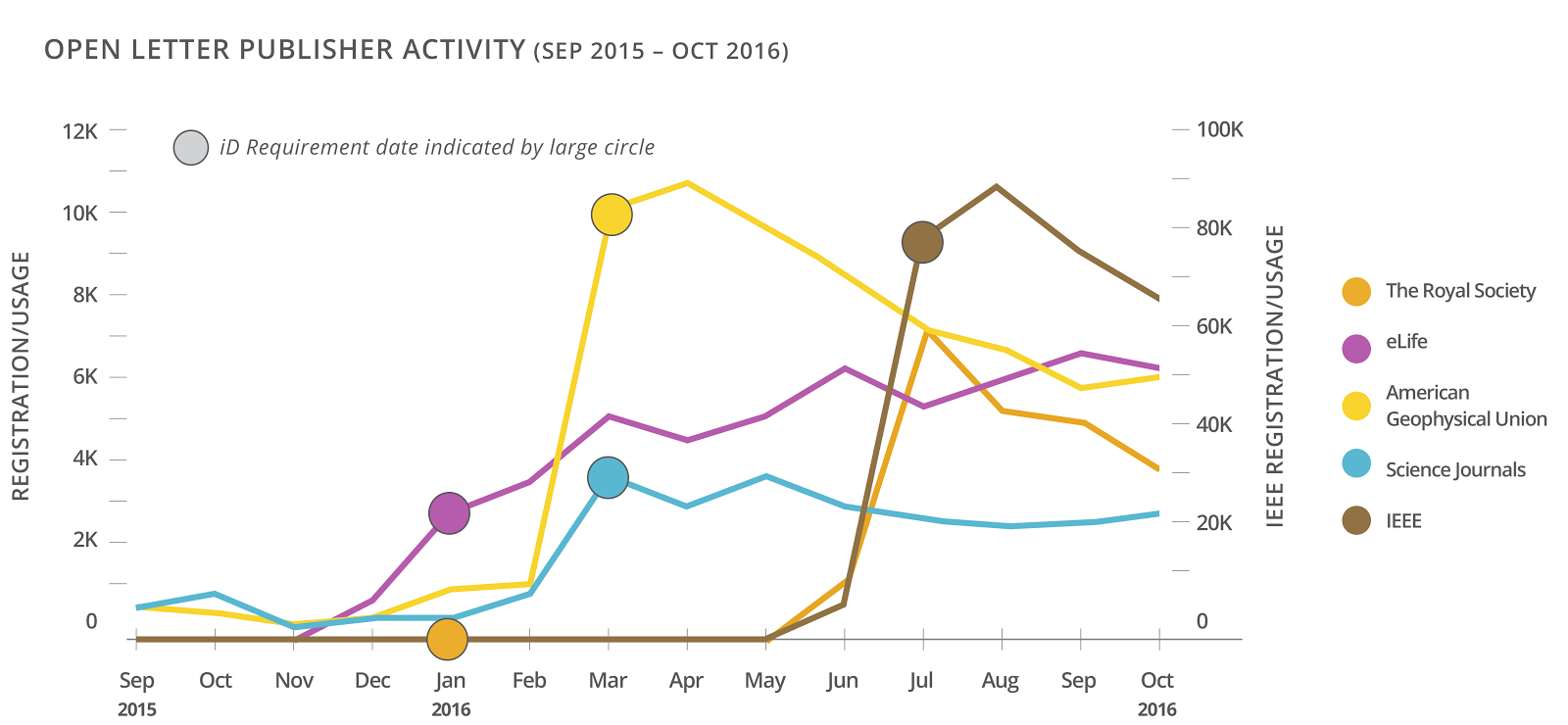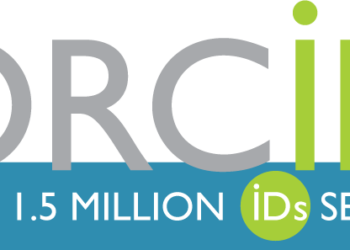Most, if not all, Scholarly Kitchen readers would probably agree that a strong and sustainable research infrastructure is important — if not essential — to scholarly communication. Robust and appropriate tools and services, widely used and adopted, reduce the administrative burden on researchers, enabling them to maximize the time they spend on research. But creating those tools and services is just the beginning; getting researchers to adopt and use them, and to understand the benefits of doing so, is often the real challenge.
In fact, research organizations are often more enthusiastic than their researchers about the value of the infrastructure. So how can we best encourage researcher uptake of key tools and services? At my organization, ORCID (full disclosure, I am the Director of Community Engagement & Support for ORCID), we believe a community-led approach works best, and during 2016 we had an opportunity to test out this theory after The Royal Society, eLife, and PLOS led an initiative to encourage publishers to commit to requiring ORCID iDs for their authors. The three organizations launched an open letter committing their own organizations to do so, and encouraged other publishers to sign up too. Critically, the letter also committed signatories to following a set of best practices developed by ORCID. These are intended to ensure that using an iD is simple and straightforward for authors, and that they can opt to benefit from having their ORCID record automatically updated with their publications.
When the letter was published on January 8, 2016, the three original organizations had been joined by five more and, as of the end of 2016, there were 25 signatories, including leading associations such as the American Chemical Society and the Royal Society of Chemistry, as well as major commercial companies Wiley and (as of March 2017) Springer Nature; 16 went live with their ORCID requirement during 2016.
This was the first coordinated initiative to encourage widespread adoption of ORCID by requiring authors to use their iD, so we were keen to evaluate the impact. Our recently published ORCID Open Letter: One Year On report includes our own analysis of the first year, as well as feedback from 12 of the publishers and associations whose ORCID requirement went into effect last year.
Unsurprisingly, all signatories saw an uptick in ORCID activity — registration and usage — after their requirement went live. A few examples are shown in the chart below (note that data for The Royal Society is only available from June, even though their requirement went live on January 1, 2016).
 Most signatories are only requiring ORCID iDs for corresponding authors – either at submission or acceptance — but a couple (JMIR Publications and ScienceOpen — both of which have been requiring iDs since 2014) also require them for coauthors. Most publishers encourage coauthors to sign up and some, such as eLife, are actively introducing functionality to make that process easier. Uptake of Crossref’s auto-update option is also on the rise, with around 150,000 ORCID records updated with over 300,000 works last year.
Most signatories are only requiring ORCID iDs for corresponding authors – either at submission or acceptance — but a couple (JMIR Publications and ScienceOpen — both of which have been requiring iDs since 2014) also require them for coauthors. Most publishers encourage coauthors to sign up and some, such as eLife, are actively introducing functionality to make that process easier. Uptake of Crossref’s auto-update option is also on the rise, with around 150,000 ORCID records updated with over 300,000 works last year.
What about the reaction from authors? Our 2015 community survey indicated that most researchers supported the idea of their organizations requiring the use of ORCID — 72% agreed or strongly agreed that these would benefit the global research community, 21% were neutral, and only 7% disagreed or strongly disagreed. Three quarters said specifically that it would be useful if their publisher mandated ORCID iDs.
These findings have been backed up by the experiences of the publishers that implemented their ORCID requirement during 2016. We will be soliciting direct feedback from researchers in our next community survey later this year; in the meantime, we did get feedback from several of the signatories. One of our favorites is this quote from a Wiley editor:
“YES!!!! Please, in the name of all that is holy and to keep me from going blind disambiguating names when doing scientometric work — we absolutely agree to require ORCID IDs for submission!”
The signatories also reported little to no complaints from authors — as of January, the American Geophysical Union had received just two significant complaints from authors out of 23,184 submissions since their requirement went live, while the Royal Society of Chemistry had received one complaint out of about 18,000 submissions since their mandate came into force.
There are clearly still some issues around the use of ORCID iDs in journal publishing workflows that need improvement. These include managing duplicate records, addressing author confusion about Crossref, and verifying affiliations. We also need to do more to articulate the value of engaging with persistent identifiers, for both authors and editors.
Creating those tools and services is just the beginning; getting researchers to adopt and use them, and to understand the benefits of doing so, is often the real challenge
We are working on all of these areas, including streamlining our login and password reset processes and hiring an Education & Outreach Specialist. We will be updating our best practice guidelines and providing more information on members.orcid.org over the coming months.
Last but not least, it’s important to note that publishers aren’t the only organizations that are starting to require ORCID iDs for their researchers. A number of funders also do so including, most recently, the National Research Foundation of South Africa. In Italy, ANVUR, Italy’s National Agency for the Evaluation of the University and Research Institutes, required researchers participating in the 2011-2014 national research evaluation exercise (VQR) to register for an ORCID iD, and connect their ORCID record and relevant bibliometric databases with all publications submitted for evaluation. And there are many more examples out there.
The ORCID experience demonstrates that a scholarly research community “village” approach really can work. Today, well over 1,500 journals published by 16 publishers and societies, require iDs for at least their corresponding authors and, from our conversations with leaders of organizations across all sectors, we know that similar approaches are actively being considered by organizations in other sectors.
This is just one example of a community-led infrastructure project; there are many others. By taking an open approach and sharing our experiences, we can learn from each other and collectively increase the effectiveness of these sorts of initiatives in future. I’d love to hear from others about what has worked for your organization and community!
Discussion
12 Thoughts on "It Takes a Village: One Year of Journals Requiring ORCID iDs"
I like ORCiD. It is mandatory for all submitting authors in the journal I am editor in chief of ( http://www.cognbehavther.com ) and I also try to get all co-authors to include it. One thing I would like is that ORCiD also includes a section of “conflict of interest”. Perhaps like the initiative published in Addiction (“Clear principles are needed for integrity in gambling research”; http://dx.doi.org/10.1111/add.12913 ). This is much needed since that never caught on. Are there any plans of including a declaration of interest in ORCiD? In addition to increasing the transparency this could possibly save much journal space and you could easily keep track of possible conflict of interests that has arisen after a paper was published. But perhaps this is a too hot topic?
Thanks Per – for supporting ORCID and for your comment about including conflict of interest information on ORCID records. It’s not quite the same thing, but Convey has now integrated ORCID so that individuals can use their iD in their disclosure document and organizations can, if they wish, require them to do so. There’s a nice slide deck here from a presentation by Heather Pierce at our October 2016 outreach meeting with more information if you’re interested: https://www.slideshare.net/ORCIDSlides/convey-orcid-integration-presentation-heather-pierce
SFI a funder in Ireland is also now requiring it. More please.
Thanks John. And yes, several funders are now requiring ORCID iDs for their grant applicants including, most recently, NRF in South Africa (see http://lists.lib.sun.ac.za/pipermail/irtalk/attachments/20170408/1870c70b/attachment.jpg). We included a partial list of funder mandates in this December 2015 blog post (http://orcid.org/blog/2017/02/15/research-funders-and-orcid-new-members-mandates-and-platforms) but would love to know of any others. It would be great if you (or anyone else) could either post details of any other organizations requiring ORCID or email them to community@orcid.org. We’ll then make this information available on our website. Thank you!
As the Wiley editor’s quote highlights, the collection of ORCID iDs in workflow provides publishers and editorial offices real workflow efficiencies, in addition to the ecosystem wide benefits. To illustrate how this works within web based manuscript tracking systems: ORCID Integration Videos
Disclosure: I work for Aries
Thanks, Ms. Meadows, for the pioneering work that you and ORCID are doing. I use ORCID, but as an editor-in-chief of a large journal of a medical subspecialty, I do not require it of our authors. Short essay on the topic is here: http://download.springer.com/static/pdf/952/art%253A10.1007%252Fs11999-016-4760-0.pdf?originUrl=http%3A%2F%2Flink.springer.com%2Farticle%2F10.1007%2Fs11999-016-4760-0&token2=exp=1492737724~acl=%2Fstatic%2Fpdf%2F952%2Fart%25253A10.1007%25252Fs11999-016-4760-0.pdf%3ForiginUrl%3Dhttp%253A%252F%252Flink.springer.com%252Farticle%252F10.1007%252Fs11999-016-4760-0*~hmac=f8baba98b6d18ce60f38854095e4df1714dcce74033b680066f8e5a913937557.
I have a unique name, and so ORCID is personally less important and I have never had a mis-attributed article (unless my sister or I forget to use our middle initials, meaning we may get mixed up!). But it would be so useful if it was rolled out more widely and I may consider requesting it from my own journal’s authors.
And, imagine if you could search for an author on Google Scholar using ORCID – which would means it would be possible on Harzing’s Publish or Perish as well. Currently, searching on “Smith, J.” is a meaningless exercise.
Apologies for not responding sooner Simon – happy to say that you can already search on Google Scholar using an ORCID iD!
Alice, those are really nice initiatives and will help in author disambiguation, clean profiles, etc – going forward. I was wondering if there are also good examples of assigning ORCID to already published content. For instance, assuming publisher X has an internal author ID, if author A indicates their ORCID, the publisher can go and say that for all content this author A has published so far we can use the same ORCID. Of course, we probably would not like to re-typeset PDFs/HTMLs, but a metadata update would be nice..
Thanks Alex. That would be wonderful but as far as I know no one is yet doing this. Publications are mostly added retrospectively via one of our search and link wizards. Please keep me posted on any work you’re doing on this – we’d be happy to support you!


